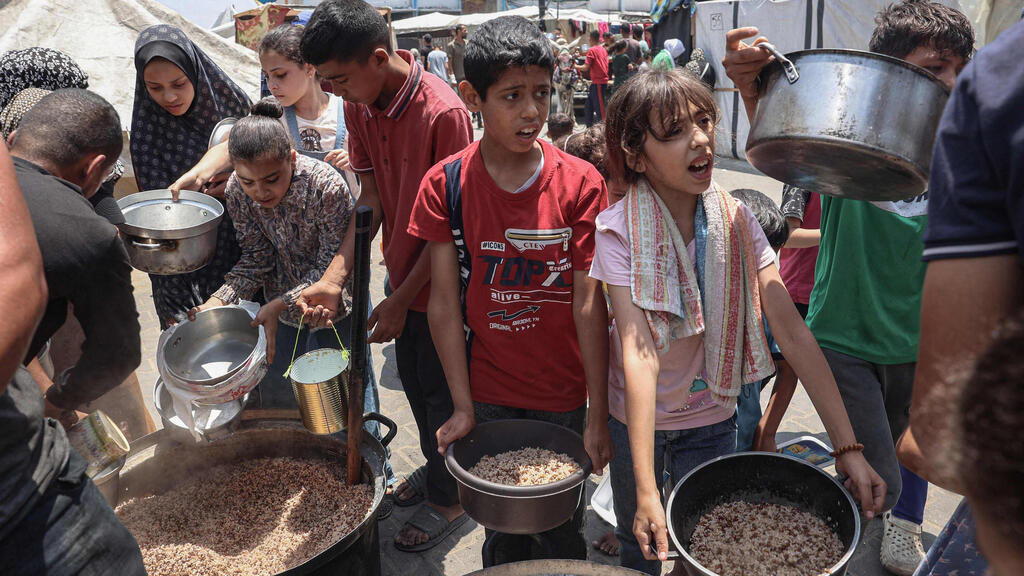[Gaza City] More than one year into the deadly war, residents of Gaza are struggling to access aid amid widespread criminal activity perpetrated by violent gangs. In one of the worst incidents so far, nearly 100 aid trucks were looted by criminal groups on November 16, worsening the already dire shortages of food, medicine, and other aid supplies for the local population. These gangs, unaffiliated with Hamas, have exploited the suffering of Gazans, profiting from a smuggling industry that inflates food prices in local markets.
“The prices are absurd and completely unreasonable,” one Gazan man said. “Just look at this crowd. Waiting four hours for a piece of bread is anything but normal.”
He said that the price of a loaf of bread had risen to $7.
Muhammad al-Faqawi, a 19-year-old from Khan Younis, said that the price of a bag of flour had reached as high as $250. “If I had the chance, I would buy one. People are dying in the streets just to get a single bag,” he said. “The rainy season is making life unbearable. Is this the future young people are destined for?”
Al-Faqawi’s assertion that people are dying in the streets is no exaggeration. Recently, three women hoping to buy some pita were killed in a crowd crush in front of a bakery in Deir al Balah.
“I’ve been here since 7 o’clock, and after an entire day, I finally managed to buy a bag of bread,” one woman who witnessed the crowd crush explained. “I couldn’t even get into the shop. People are dying just to get in. I don’t have the strength to face that.”
As widespread theft and black-market price gouging keep Gazans from obtaining essential staples, Hamas has created an armed force to take control of the situation. According to Hamas’ Al-Aqsa television channel, the force killed at least 20 looters in the November 16 incident.
The Hamas merchants’ office declined to comment.
“We are starving and cannot bear this situation. Prices have skyrocketed, and we can no longer afford even the basics,” al-Faqawi said. “I want to tell the entire world, and [Israeli Prime Minister Benjamin] Netanyahu in particular, that we can’t endure this any longer. We’re not truly living.”
He said that a 10-shekel coin — equivalent to around $3 — is “useless” given the rampant inflation. “You might as well throw it away,” he said.
2 View gallery


Humanitarian aid trucks at the Kerem Shalom Crossing into Gaza
(Photo: Amir Cohen/Reuters)
Moss Hamdan, a shoe repairman from Khan Younis, described the situation as “terrible.”
“There is high demand for food, but a single can of milk costs $10. How can anyone afford that? Basic staples such as oil, sugar, and rice are in high demand, but they are far too expensive,” he said. “I no longer have a job, and neither does anyone else. Life here is extremely difficult. Airplanes fill the sky daily, and nothing feels secure or reliable. Everything is for sale, even water. Please, make it stop.”
Abdul Majeed Al-Kurd, a merchant and currency exchanger, called on authorities to address the situation. “Merchants exploit people, forcing them to pay bribes just to survive,” he said.
Al-Kurd has been working in the currency exchange market for 40 years. “I refuse to engage with unlawful individuals,” he said, describing looting and price gouging as against Islam.
“Unfortunately, the Bank of Palestine has encouraged these practices,” he said. “If the bank claims to promote mercy, it should send employees to the markets, pay people’s salaries, and take action to address the crisis. It must inject money into the market and take decisive action – this is its responsibility.”
Tobacco has become a critical commodity in Gaza. Before the war, a packet of cigarettes cost around $5. Now a single cigarette can cost $49. For this reason, many people have found alternative ways to sell tobacco at more reasonable prices.
“We try to lower prices so people can afford to smoke,” according to Muhammad al Aqraa, a tobacco seller from Deir al Balah. “We sell cigarettes for $7 or $8 because the economic situation is terrible. Those who had money have spent it all during the war, while some merchants continue to take advantage of others.”
“As young people, we want to smoke, but it’s simply unaffordable,” he said.
Nael Abu Amara, a tobacco seller from Gaza City, said that prices for cigarettes rose from $20 to $55 over the course of a day.
“God never commanded people or merchants to treat us this way. The prices people face are unjust and unacceptable — neither we nor God can condone such actions,” he complained.
Most families in Gaza have numerous children, and parents are desperately struggling to care for their most basic needs.
Get the Ynetnews app on your smartphone: Google Play: https://bit.ly/4eJ37pE | Apple App Store: https://bit.ly/3ZL7iNv
Sharifs Al-Hajj, a mother from Deir al Balah who is pregnant, said that she has had to beg for bread to stave off hunger. She said that the price of sugar had risen from about $1.50 to $14.
“There is no electricity, no food, and no health care. There’s no margarine, chicken, chickpeas, corn — nothing at all,” she said.
She said that she and her children recently experienced bombings and are in desperate need of milk, medical care and warm clothing.
“We’ve lost everything,” she said. “We want a cease-fire. A cease-fire as soon as possible. We want it now.”
The Media Line Staff contributed to this report.


